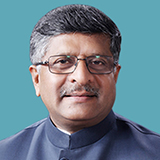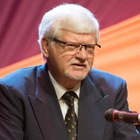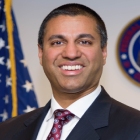

05:30 - 05:30

09:30 - 14:30

15:30 - 16:30








16:30 - 17:15
The United States’ once overwhelming dominance over technology and data flows is being challenged, notably by China, but also by Europe and countries in emerging Asia. Concurrently, these flows have become indelibly linked with the security and stability of states and societies. With calls for new instruments, like the D10, as well as growing battles over standard-setting and norm-making on emerging technologies, are witnessing the resurgence of the Leviathan in cyberspace?







16:30 - 17:15
The United States’ once overwhelming dominance over technology and data flows is being challenged, notably by China, but also by Europe and countries in emerging Asia. Concurrently, these flows have become indelibly linked with the security and stability of states and societies. With calls for new instruments, like the D10, as well as growing battles over standard-setting and norm-making on emerging technologies, are witnessing the resurgence of the Leviathan in cyberspace?







16:30 - 17:15
The United States’ once overwhelming dominance over technology and data flows is being challenged, notably by China, but also by Europe and countries in emerging Asia. Concurrently, these flows have become indelibly linked with the security and stability of states and societies. With calls for new instruments, like the D10, as well as growing battles over standard-setting and norm-making on emerging technologies, are witnessing the resurgence of the Leviathan in cyberspace?







17:30 - 18:15
In 2020, even as the world came to a halt, battle lines were drawn over the testing and deployment of 5G. With more countries opting to distance themselves from Huawei and ZTE over their cosy relationship with the CCP, others have dug in their heels in refusing to ban foreign vendors. This panel will discuss the strategies different geographies are adopting to balance the imperatives of security, sustained economic growth and the binary between the US and China on 5G.






17:30 - 18:15
In 2020, even as the world came to a halt, battle lines were drawn over the testing and deployment of 5G. With more countries opting to distance themselves from Huawei and ZTE over their cosy relationship with the CCP, others have dug in their heels in refusing to ban foreign vendors. This panel will discuss the strategies different geographies are adopting to balance the imperatives of security, sustained economic growth and the binary between the US and China on 5G.






17:30 - 18:15
In 2020, even as the world came to a halt, battle lines were drawn over the testing and deployment of 5G. With more countries opting to distance themselves from Huawei and ZTE over their cosy relationship with the CCP, others have dug in their heels in refusing to ban foreign vendors. This panel will discuss the strategies different geographies are adopting to balance the imperatives of security, sustained economic growth and the binary between the US and China on 5G.






18:30 - 18:40


18:30 - 18:40


18:30 - 18:40


18:45 - 19:30
In an era marked by “deglobalisation” and “regionalisation”, countries are examining not just trade interdependencies but also those in cyberspace. From complete supply chain security for components to indigenous API stacks and data protection, the concept of security in cyberspace now encompasses every minutia






18:45 - 19:30
In an era marked by “deglobalisation” and “regionalisation”, countries are examining not just trade interdependencies but also those in cyberspace. From complete supply chain security for components to indigenous API stacks and data protection, the concept of security in cyberspace now encompasses every minutia






18:45 - 19:30
In an era marked by “deglobalisation” and “regionalisation”, countries are examining not just trade interdependencies but also those in cyberspace. From complete supply chain security for components to indigenous API stacks and data protection, the concept of security in cyberspace now encompasses every minutia






10:30 - 13:30

15:15 - 15:25


15:30 - 16:15
The unprecedented reach and impact of the pandemic has been met with an all-hands-on-deck race to develop solutions, from contact tracing application and COVID Hackathons, to the use of cloud computing and AI to develop vaccines. What can governments do to create an enabling policy environment for the safe development, testing, deployment and use of these new solutions?






16:45 - 17:15
The rapid proliferation of surveillance and monitoring technologies in the wake of the pandemic has put the spotlight on questions around privacy, digital inclusion and rights. As countries and companies adopt “solutions” which require individuals to forego bodily privacy to maintain their livelihoods and mobility, it is imperative to caution against the new “abnormal” we may be creating. Are rights and safety truly a dichotomy? How can we build upon the current crisis to create a 'tech by all' and a 'tech for all' regime?






17:00 - 19:00

17:45 - 17:55


18:00 - 18:45
From heads of state to terrorists, there is no shortage of actors willing to manipulate platforms to create and amplify mis- and disinformation. The Covid-19 pandemic has fed into an existing infodemic, further damaging the digital public sphere. This is a global problem, with research suggesting that malicious actors are increasingly “bandwagoning” onto each other’s information operations. Although states have begun to address to the crisis of mis- and disinformation, global responses remain disparate and fragmented. How can states, platforms and communities balance tensions between national legal regimes and international rights frameworks in cyberspace?






10:00 - 13:00

15:00 - 15:15


15:30 - 16:15
For centuries labour relations have centred around a common workspace—a reality that technology, recently aided by the coronavirus, is altering rapidly. With the rise of digital blue-collar work and ‘cloud’ offices, what will the future of unionisation and negotiation look like? How should legislation recognise new forms of collectives and bridge information asymmetry between workers and management?






16:30 - 16:40


16:45 - 17:15
Over the past few years, several surveys have documented an interesting phenomenon: women tend to “trust” AI less than men—reflecting perhaps an intuitive understanding that predictive algorithms will discriminate along age old social fault lines, as demonstrated amply by AI tools that have brought decades of discrimination in hiring to light. Are gendered perspectives on the virtual or semi-virtual workspace given enough attention? How do we ingrain the notion of equity in hiring, work environment and organisation processes?






17:45 - 17:55


18:00 - 18:45
Technology is an integral part of India's socio-economic growth story. India is witnessing two pivotal women-centric phenomena at this time: One, there is an unparalleled inclusion of women in the Indian economy, powered by technology platforms like the India Stack. Two, women are increasingly pushing the boundaries of technology development. How can government, entrepreneurs, innovators and policymakers come together to strengthen this trend and unlock greater indigenous innovation-led growth?




10:00 - 10:10


10:15 - 11:00






15:15 - 15:25


15:30 - 16:15
Open societies find themselves increasingly vulnerable to malicious actors. Information flows and public opinion; political campaigns and individuals; systems for registration and voting; and related electoral infrastructure are all at risk from coordinated influence operations, both domestic and foreign. What legal frameworks, technological tools, and safeguards can democracies adopt to protect the sanctity of the polling booth?







16:45 - 17:30
Human beings, in certain conditions, inherently trust decisions made by machines over those made by humans, sometimes at the cost of independent human judgment. Is it time to assess where technologies have become an impediment rather than a solution? How can we foster resilience to malicious interference and harmful narratives at an individual and organisational level?







17:45 - 18:30






10:35 - 10:45


11:15 - 11:45
For millions of us this year, our screens became our window to the world and content creators -- from advertisers, to filmmakers and writers -- were faced with the challenge of continuing to tell compelling stories even as everything shut down. How has the art and content of storytelling adapted to these strange times?




12:00 - 12:45
As the countries shut down, digital growth, especially in emerging economies, has boomed as cities turned to services online, from food and work to entertainment and leisure. Digital payments will play an increasingly critical role in the emergent digital-first economies. However, in several instances, the nascency of alternative payments systems has resulted in a lacuna of trust amongst consumers, as well as a challenge for regulators navigating unfamiliar waters. How can the friction between regulators, consumers and fintech players be minimised? What are some emerging models of regulated innovation in the digital payments space?







14:45 - 15:15
In the midst of the pandemic, even as movie halls across the world emptied out, subscribers for video streaming services shot up, video game sales soared, and music artists held vibrant, interactive concerts online to an audience that far outnumbered those at physical venues. Are we witnessing the slow death of traditional media or a new era of cross-media content creation?




15:15 - 15:25


15:30 - 16:15
Over the years, online platforms have become key enablers of important public discourses. Consequently, public spheres are being influenced by private corporations, as discourses on such platforms are subject to the normative frameworks administered by their providers. This raises the question, do corporations have the standing to moderate public discourses, including those in external jurisdictions, by applying their own subjective parameters? What measures should be taken to ensure that these discussions remain truly free and open? Is social media out of control?





16:30 - 16:40


16:45 - 17:30
The largest technology giants of our times are not the ones selling a physical “product” but in the acquisition of the attention of its users. Different geographies have adopted different approaches to balance the competing demands of state, citizen/user and industry. Some have resulted in an adversarial relationship between the three, while others are seeking synergies. This panel will explore the best practices arising out of these competing models of data governance.






17:30 - 17:45



19:00 - 20:30